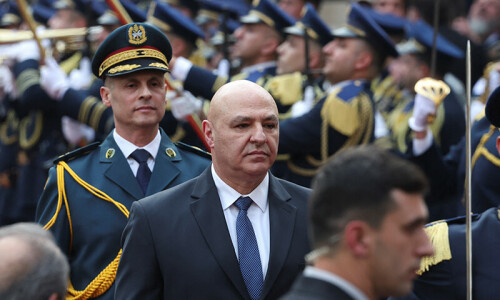ISLAMABAD, May 1: The Asian Development Bank (ADB) has said that Pakistan’s imports are increasing in 2007-08 because of higher international oil prices and rising demand for raw material for industrial use.
With the expectation of a moderate expansion in global trade and a slowdown in US economy, export growth is expected to remain contained in the face of an increased competition in global textile markets and a continued lack of diversification of both export commodities and markets, it further stated.
FY2008 is thus likely to see the trade deficit deteriorate to 7.1pc of the GDP, and the current account deficit would remain high at 5.5pc of the GDP, says bank’s South Asian economic report also made available to Dawn.
It also said that continuation of tight monetary policy, high international oil prices, and slow export growth are expected to curb GDP growth to 6.5pc in 2007-08.
It said expansionary fiscal policy is expected to continue during the current financial year, with a large increase in spending on development and relief measures announced in the federal budget.
Public sector development expenditures, including expenditure on rehabilitation of earthquake affected areas, are projected to increase by 19.9pc from the FY2007 level.
After a slight reduction in the pace of expansion in FY2006, Pakistan’s economy posted a robust and broad-based growth in FY2007, expanding 7.0pc.
The momentum of growth is expected to continue into FY2008 in the wake of budgetary measures aimed at supporting productivity in the agriculture sector and boosting investment in the manufacturing sector.
Strong aggregate demand in recent years has catalysed growth in Pakistan, but has also generated inflationary pressures.
Inflation peaked at 9.3pc during FY2005, but declined only marginally to 7.8pc in FY2007 from 7.9pc in FY2006.
Measures taken by the central bank during the first half of FY2007 (tightening monetary conditions) led to control of overall core inflation. However, shortages of some essential food items, such as rice, edible oil, meat, pulses, milk and fresh vegetables — notwithstanding the overall strong recovery of the agriculture sector — boosted inflation of food to 10.3pc in FY2007.
Food prices increased further to 10.7pc in October 2007. Overall inflation, however, continued a gradual decline to 7.5pc due mainly to reduced inflation for non-food items and maintenance of tight monetary conditions.
Notwithstanding the tight monetary policy, fiscal policy continued to be expansionary.
Total public expenditure in FY2007, at Rs1,675bn, was 19.5pc higher than the previous year.
Actual development expenditure in FY2007, at Rs434bn, also was higher (18.9pc) than development expenditure the previous year.
Despite strong revenue performance, the fiscal deficit as a percentage of GDP rose to 4.3pc in FY2007.
The remarkable increase (around 20pc) in revenue collection the same year did not prevent tax revenue as percentage of the GDP from falling slightly to 10.5pc in FY2007 from 10.6pc in FY2006.
Import growth decelerated sharply to 7.9pc in FY2007 from 33.3pc the preceding year, a result of the reduced demand for consumer goods and industrial inputs, as well as softening of international oil prices during the first half of the fiscal year.















































Dear visitor, the comments section is undergoing an overhaul and will return soon.